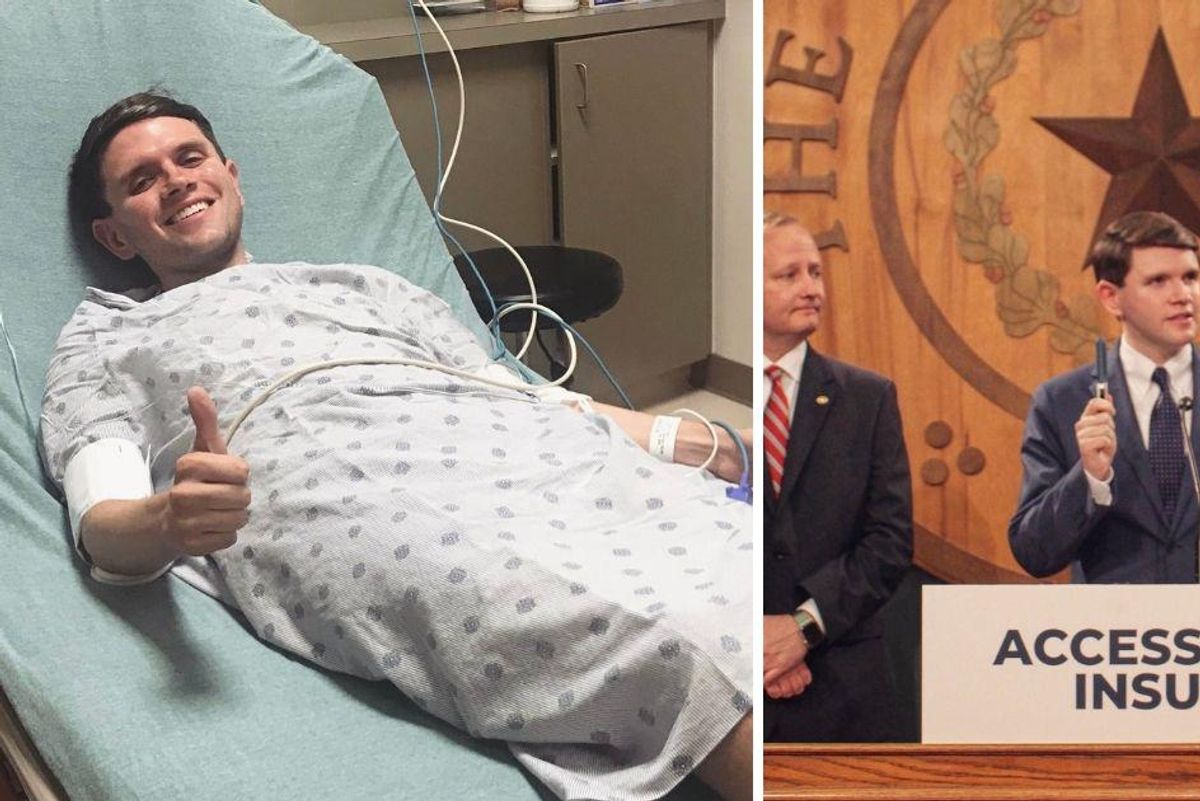Texas man was hospitalized with diabetes. 3 years later, he's a lawmaker fighting insulin costs.

The difference between a politician and a public servant may be a matter of semantics, but when it comes to getting legislation passed that actually helps people, the contrast is stark.
Texas Representative James Talarico is on a mission to get his constituents the life-saving medicine they need. The 31-year-old lawmaker has just introduced legislation that would cap the price of insulin—a medicine people with type 1 diabetes need to live, which has become unaffordable for many—at $50 a month.
The mission is personal for Talarico, as he nearly died three years ago when he was diagnosed with type 1 diabetes.
He shared his story on Twitter:
"In May 2018, I was a healthy 28-year-old running for the Texas House. I decided to walk the entire length of my district and hold town halls along the way. I hike Big Bend every year, so I wasn't concerned about a 25 mile walk...
But halfway through the walk, I began feeling nauseous and fatigued. Before the town hall in Hutto, I vomited in the bathroom."
Taralico assumed he was dehydrated, so he changed his shirt, drank some water, and kept walking. He threw up four more times in the last 12 miles of the walk, but finished it.
"After the walk, I went to bed thinking I needed a good night's sleep," he wrote. "But I slept for 36 hours."
"My parents rushed me to the hospital where nurses checked my blood sugar. A normal blood glucose level is below 100. Mine was 900. I was immediately diagnosed with type 1 diabetes."
Type 1 diabetes is an autoimmune disease with an unknown cause. It can come on at any time but is usually diagnosed before age 40. (Most type 1 diabetics are diagnosed between ages 4 and 14.) Unlike type 2 diabetes, which can generally be controlled with dietary changes, type 1 diabetics must inject themselves with insulin because their pancreas can't produce it.
Talarico was in diabetic ketoacidosis (DKA), which will lead to a coma and death unless the person is given insulin. He spent five days in the ICU.
"Now I have a glucose monitor on my arm & take shots of insulin every day," he wrote. "As long as I take care of myself, I'll live a long life."
However, he discovered firsthand how the cost of insulin can be life-threatening for people. He pointed out that in the last 20 years, insulin prices have shot up 1200% while manufacturing costs have stayed relatively constant.
"Even with health insurance, I paid $684 for my first 30-day supply of insulin—the medicine I need to live," he wrote. "I had to put it on a credit card.
Now that I'm a legislator, I have excellent state health insurance to cover my insulin. Every Texan should be entitled to the same."
As Talarico explains it, there are three primary reasons for the price hike:
1) The $27 billion global insulin market is a monopoly controlled by three companies: Sanofi, Eli Lilly, and Novo Nordisk. They can fix their prices, and appear to increase them in lockstep with one another.
2) There's no generic option. Because insulin is a biological product and not a chemical one, it's harder to produce a generic version. "The big three companies enter into 'pay for delay' schemes where they pay potential biosimilar manufacturers not to enter the market," he wrote.
3) These companies have no competition. "The big three companies surround their insulin patent with lots of other patents to make the original patent last longer (known as 'evergreening')," he wrote. "Then they spend millions in lobbying to prevent policymakers from closing any of these loopholes."
"Putting profits over people has deadly consequences," Taralico added, pointing out that Texans with diabetes fund their necessary medicines with GoFundMe pages or resorting to the black market. "And in the richest country in the world, 1 in 4 diabetics risk their lives by rationing insulin."
Taralico's legislation would cap out-of-pocket costs for insulin at $50 per month, in addition to requiring the Attorney General to investigate rising prices. His bill in the House and a complementary bill in the Senate make up "a bipartisan, bicameral effort" Talarico says. If passed, the legislation would make Texas the 16th state—and the largest one—to put a cap on insulin prices.
"Insulin should be free, because insulin is a human right," Talarico wrote. "This is an idea that's time has come."
Here's hoping that the Texas legislature supports Talarico's efforts and makes this life-saving medicine affordable for all diabetics. And here's hoping that more states follow suit.
- American Girl's newest doll accessory is about so much more than ... ›
- Heartbroken mom who can't afford her son's insulin asks how other ... ›
- High insulin prices driving people to Canada - Upworthy ›
- Researchers have made insulin that doesn't need refrigeration - Upworthy ›
- Researchers have made insulin that doesn't need refrigeration - Upworthy ›



 A Baby Boomer garage filled with stuff.
A Baby Boomer garage filled with stuff.



 A van travels down the road.
A van travels down the road.  A person plays the guitar.
A person plays the guitar.  A man smiles.
A man smiles.  A damaged vehicle sits on the side of a road.
A damaged vehicle sits on the side of a road. 